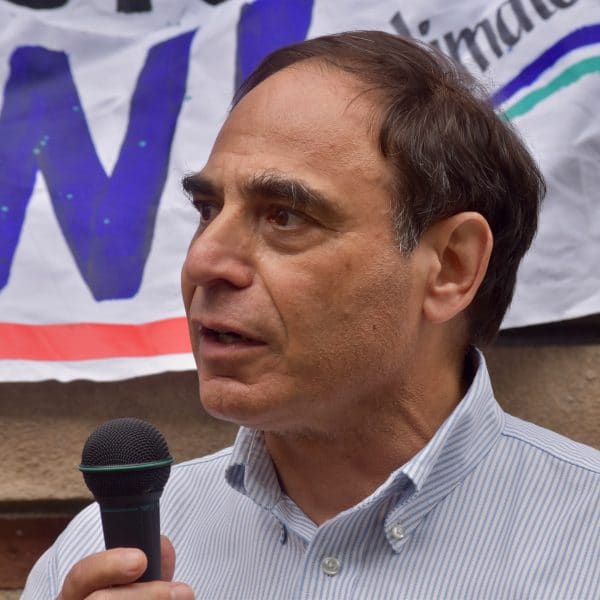CLF’s Jerry Elmer: Invenergy has a disclosure problem
“Invenergy has a disclosure problem,” says Conservation Law Foundation (CLF) Senior Attorney Jerry Elmer, and the company’s recent filing with the Energy Facilities Siting Board (EFSB), “just made that problem much worse.” Invenergy is the company that wants to build a $1 billion fracked gas and diesel oil burning power plant in the pristine forests of northwest Rhode Island. CLF
November 2, 2017, 12:09 pm
By Steve Ahlquist
“Invenergy has a disclosure problem,” says Conservation Law Foundation (CLF) Senior Attorney Jerry Elmer, and the company’s recent filing with the Energy Facilities Siting Board (EFSB), “just made that problem much worse.”
Invenergy is the company that wants to build a $1 billion fracked gas and diesel oil burning power plant in the pristine forests of northwest Rhode Island. CLF is the organization tasked with opposing the power plant in the quasi-judicial licensing hearings before the EFSB. The Town of Burrillville, where the plant is to be located, is also opposed to the plant and represented in the hearings.
Elmer explains:
“On Friday, October 27, the Town of Burrillville filed in the EFSB a Motion to Dismiss the EFSB docket. The reason that Burrillville gave for seeking dismissal was Invenergy’s failure to disclose the Fall River water contract,” said Elmer by way of explanation.
“Invenergy has repeatedly failed to disclose the CREC-Fall River Water Agreement to the EFSB,” reads Burrillville’s Motion to Dismiss, “despite multiple opportunities to disclose it and a continuous obligation to do so.”
On October 31, continues Elmer, “CLF filed in the EFSB a Response to Burrillville’s Motion to Dismiss, saying that Invenergy’s problems with not disclosing relevant information and with providing false information go all the way back to Invenergy’s very first filing with the EFSB on October 29, 2015. CLF agreed with Burrillville’s reasoning (dismiss the case because of Invenergy’s failure to disclose the Fall River water contract) but CLF pointed out other, additional failures by Invenergy as well.”
Despite these late and confusing admissions, Invenergy keeps pressing the EFSB to rush ahead with the hearings, says Elmer.
In Invenergy’s letter to the EFSB dated November 1, says Elmer, “Invenergy acknowledges that the newly available information (that Invenergy is not even qualified to bid into the ISO’s FCA-12 in February 2018) means that the EFSB will have to get all-new Advisory Opinions from at least two state agencies: Division of Planning and the Office of Energy Resources. (Invenergy’s admission appears on page 1, paragraph 3, 4 lines from the bottom of the page.) In addition, CLF has pending in the EFSB a request for a new Advisory Opinion from DEM ‘on the effects of the water contract with the Narragansett Indian Tribe on Charlestown’s sole source water aquifer.'”
This means that Invenergy’s filing with the EFSB yesterday is going to push the Final Hearing in the case out by several months while we wait for state agencies to finish new advisory opinions.
“But in a broader sense,” says Elmer, “Invenergy has a (potentially serious) disclosure problem. The first sentence of John Niland’s letter to the EFSB states that Invenergy is not qualified to participate in FCA-12. (Niland even put the words ‘not qualified into boldface type.) Niland then provided a detailed analysis of what this means, prepared by Invenergy’s outside consultants, PA Consulting Group.
“This analysis must have taken at least weeks to prepare.
“That means,” says Elmer:
- Invenergy has known for weeks (or months) that its Turbine Two was disqualified from participating in FCA-12.
- Invenergy has withheld that information from the EFSB and all the parties for weeks (or months).
Burrillville and CLF have a motion pending to dismiss the docket as a sanction for Invenergy failing to disclose relevant information.
“The bottom line is that even while there was a pending motion to dismiss the docket for Invenergy’s failure to disclose certain information (about the Fall River water contract),” said Elmer, “Invenergy was actively hiding much more important information (about being disqualified from the ISO auction). And while all this was going on, Invenergy was pushing the EFSB to move ahead quickly with the Final Hearing, even while Invenergy was sitting on (and failing to disclose) information that would almost certainly postpone the Final Hearing again.
“Invenergy has a serious disclosure problem,” said Elmer. “And Invenergy’s filing with the EFSB… has made that problem much, much worse.”
See previous reporting:
https://upriseri.com/energy/2017-11-01-invenergy-fca12/






